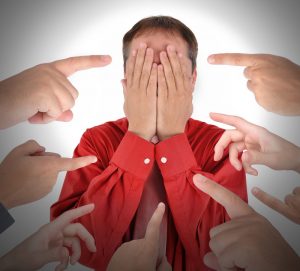“Public shaming as a blood sport has got to stop.”
How many of us have experienced the feelings of shame and humiliation at some point in our lives? How many parents have felt the helplessness of watching their child be bullied or publicly excluded? How many of us have clicked on a Facebook or news link that was all about shaming another person for one thing or another? The price of shame is a high commodity in today’s world, whether it is found in the school yard, a social media platform, the evening or never-ending internet news.
Recently, Monica Lewinsky has re-emerged in the public arena, but this time for a very different reason. In 1998, she was thrust in the spotlight for engaging in a very public affair with President Bill Clinton as a 21 year old intern, but today she speaks out as a woman who has endured and learned a great deal. Ms. Lewinsky is an advocate for fighting back against cyber-bullying, a topic she knows all too well. I’ll admit that I didn’t initially have high hopes when I watched her TED Talk, but I found myself feeling very grateful for the message she shared. Here are some key ideas from Ms. Lewinsky’s talk:
Shame Is A Cultural Commodity
Our current culture exploits someone’s poor choices or misfortunes as a way to make money and get attention. Satire certainly has its place, but benefiting off of someone’s sincere pain and embarrassment is nothing short of cruel. Shame is an industry, and since sex sells, unfortunately the media will likely be making jokes (and making headlines) at Monica’s expense forever. But what’s really sad is that there is a market for this kind of shame; people want to see others mocked, so the media will continue to perpetuate this cycle. During the recent election season, we have seen plenty of this- and it is adults who are buying and selling shame! We need to remember what we are modelling for our little ones who are watching our every move. We’d do well to remember that as consumers, we can either add to or detract from the current societal demand for shame.
The Internet is the Major Purveyor of Shame
“Cruelty to others is nothing new, but technologically enhanced shaming is amplified, un-contained, and permanently accessible.” – Monica Lewinsky
We know that in our culture, social media has amplified our awareness of what everybody else is doing, whether it is wanted or not. We care if there are not very many likes on our posts or our feeds aren’t being shared. What is also occurring though, and not just in high school, is that many use their social media platforms to shame others or call attention and abuse those who are deemed not good enough. How many Youtube videos are there of other people being clumsy or making mistakes or acting silly or socially awkward? Many of the teens in my practice have shown me their favorite Youtube clips and it is almost always laughter at the expense of someone else. This is then being viewed and shared by millions, taking shame to a new level. What used to be a neighborhood “event” now has a global viewership, with internet trolls as well as everyday people only too happy to encourage the shame game.
Shame Cannot Survive Empathy
Despite her own heart-wrenching experience (in which she admitted that she considered suicide), Ms. Lewinsky’s message is ultimately one of hope. To all who have suffered cyber-bullying, extreme embarrassment, or any other sort of public shaming, these things ARE survivable! By reaching out and telling our stories to people we trust, by raising public awareness of the dangers and cruelty of online harassment, we can heal those who’ve been harmed and also prevent such abuse from taking place further. After twenty years of being dragged through the dirt, being called every sexually derogatory name imaginable, being denied career opportunities, and ultimately dealing with the heavy aftermath of a private mistake with a very public audience, Monica Lewinsky’s resilience, courage, and commitment to her cause as an advocate is inspiring.
Ms. Lewinsky encourages all of us to be upstanders (not bystanders), and to take a stand when someone is being mistreated or cruelly harassed. In the wake of this election and throughout life, it is my hope that we can all become Upstanders and not bystanders. That we can take charge of our own stories and write our next chapter- filling it with hope and human decency. Enjoy Monica Lewinsky’s Tedtalk and The Price of Shame.
What did YOU think of this TED talk?


comments +